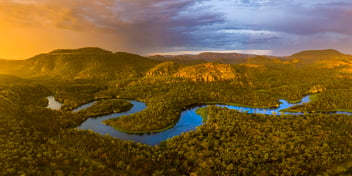Call to prioritise Aboriginal water rights
Aboriginal and Torres Strait Islander Australians face huge challenges in terms of ensuring their water rights and values are maintained at local, state and national level, and one researcher says it’s time to put indigenous water rights front of mind.
Presenting at the this year’s Australian Water Association ACT Water Matters Conference in June, University of Canberra PhD candidate and Kamilaroi man Bradley Moggridge said making sure the cultural, spiritual and economic values of Aboriginal people are not diminished by modern-day water policy affects all levels of planning.
“The challenges we face are about the state of play. The platform is problematic from an Aboriginal perspective, including issues with legislation and policy at national and state and territory levels,” Moggridge said.
“I have concerns about Aboriginal water rights issues at basin and catchment level too.
“There are a lot of areas where Aboriginal people just have to fit in or retro-fit, but we are never put up front in the process. A lot of the time, policy briefs fail to include Aboriginal people; we are an afterthought.”
Moggridge said political cycles and changes in leadership have a significant impact on progress, with changes in focus usually bringing cuts to programs established to improve Aboriginal input on matters relating to water planning and custodianship.
“New governments come in and try to do things that have failed in the past, and Aboriginal people are set up to fail again,” he said.
“For example, under the water resource planning process, NSW has put Aboriginal people on its stakeholder advisory panels, but with no capacity to make sure they are informed and have the means to go back to their communities to discuss what is happening.”
Moggridge said frustration stems from a failure to properly integrate how water is valued and allocated with Aboriginal peoples livelihoods and culture.
“It comes down to the value of water. Unfortunately, because water is a commodity, it’s tradeable and the cultural value of water disappears when you add a dollar sign. When Aboriginal people don't have a right to water, they don't have water as a commodity either,” he said.
“Water was given away in the past, when you had land. This was back when Aboriginal people didn’t have the legal rights of human beings. We might have land now, but where are communities going to get the money to buy their right to water?”
Improving Aboriginal people’s water rights in Australia will require ensuring policy consultation includes meaningful input from Aboriginal communities, whether that’s a peak indigenous water body or a national indigenous water strategy, Moggridge said.
“It’s about making sure people think up front to include Aboriginal people as a stakeholder. As a water user, but also as a water caretaker,” he said.
“We have to care for the water that sustains us. It’s about making sure our values to water and the environment are included when we start making policy decisions.”
Register for the Australian Water Association ACT Water Matters Conference to hear more from Bradley Moggridge about the water rights challenges facing Aboriginal Australians.


